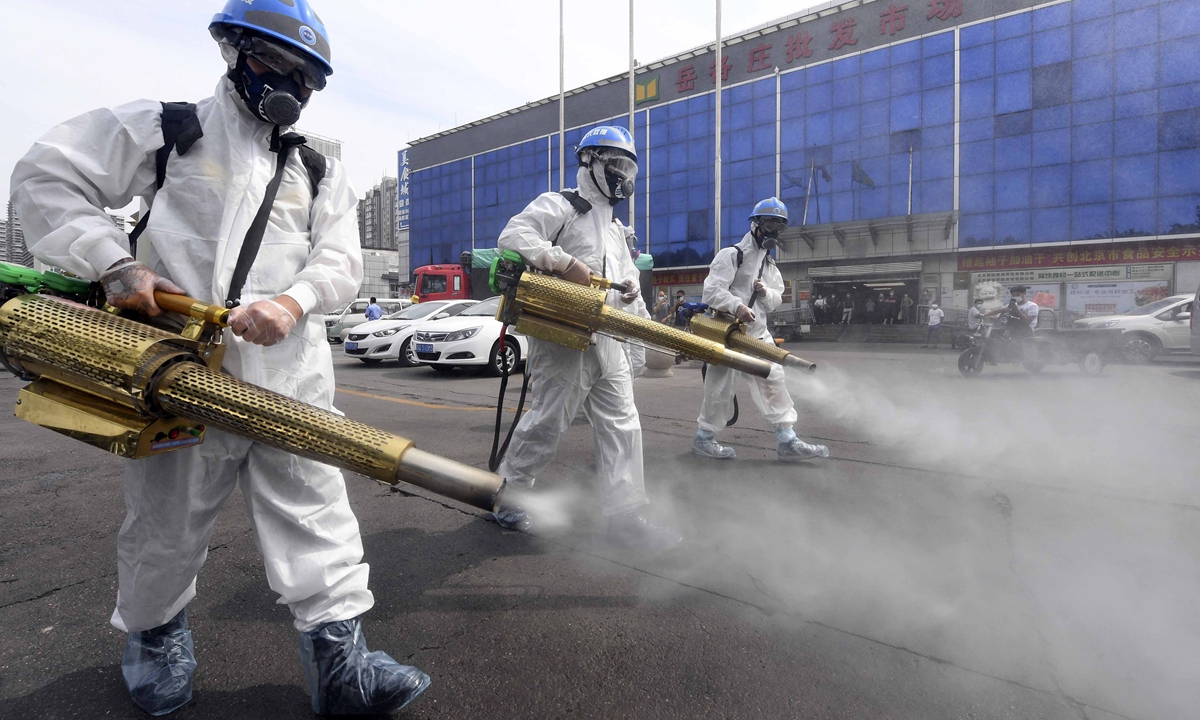Cities step up measures as new outbreak puts Beijing into 'soft lockdown'
Source:Global Times Published: 2020/6/17 11:31:18

Volunteers from the Beijing Blue Sky Rescue Team spray disinfectant in Yuegezhuang wholesale market in Fengtai district, Beijing. The market is about 12 kilometers from the Xinfadi market, which is linked to the recent COVID-19 outbreak in the capital city. Photo: people.cn
More COVID-19 cases connected to the capital's latest cluster of infections have been reported outside Beijing, as cities take further measures to prevent the spread of the virus.
China on Tuesday registered 33 domestic infections, including 31 in Beijing, one in neighboring Hebei Province and one in East China's Zhejiang Province, all connected to Beijing's Xinfadi market, health authorities said on Wednesday.
Hebei on Wednesday also reported an asymptomatic carrier related to the infection chain.
The Zhejiang patient runs a business in Xinfadi market and developed symptoms of fever, cough and chest tightness. Eleven of the patient's close contacts returned negative nucleic acid tests and are under centralized quarantine.
The infection chain detected from Xinfadi market has already spread to Northeast China's Liaoning with two patients, and Southwest China's Sichuan province with one case. Hebei, in the vicinity of Beijing, has so far reported eight patients connected to the cluster infections.
Due to the serious epidemic control situation, cities have issued policies to prevent further spread of the virus.
Northeast China's Heilongjiang Province, hit hard by the last small outbreak, stipulated that people from Beijing's medium- and high-risk areas and who have connections with Xinfadi market should undergo 14 days of centralized quarantine followed by seven days of home quarantine.
Visitors are also required to take four nucleic acid tests and a serum antibody test during the process. People who have already been in the province for a few days are asked to complete the remaining period in quarantine, local authorities said.
More cities including Shanghai and Guangzhou require people coming from medium- and high-risk areas in Beijing to undergo 14-day quarantine.
Beijing has raised its emergency response to level II and so far announced one high-risk and 27 medium-risk neighborhoods. People from these areas and those with connections to Xinfadi are not allowed to leave the city, and people from low-level risk areas are required to submit negative nucleic acid test result within seven days of departure to leave the city. Many interpreted the policies as a "soft lockdown" aimed at reducing travel as much as possible.
Some airlines and the country's railway operator have issued new policies waiving cancellation fees, as many people are now changing their travel plans for the upcoming Dragon Boat holidays, which falls on the last week of June.
Global Times
Posted in: SOCIETY